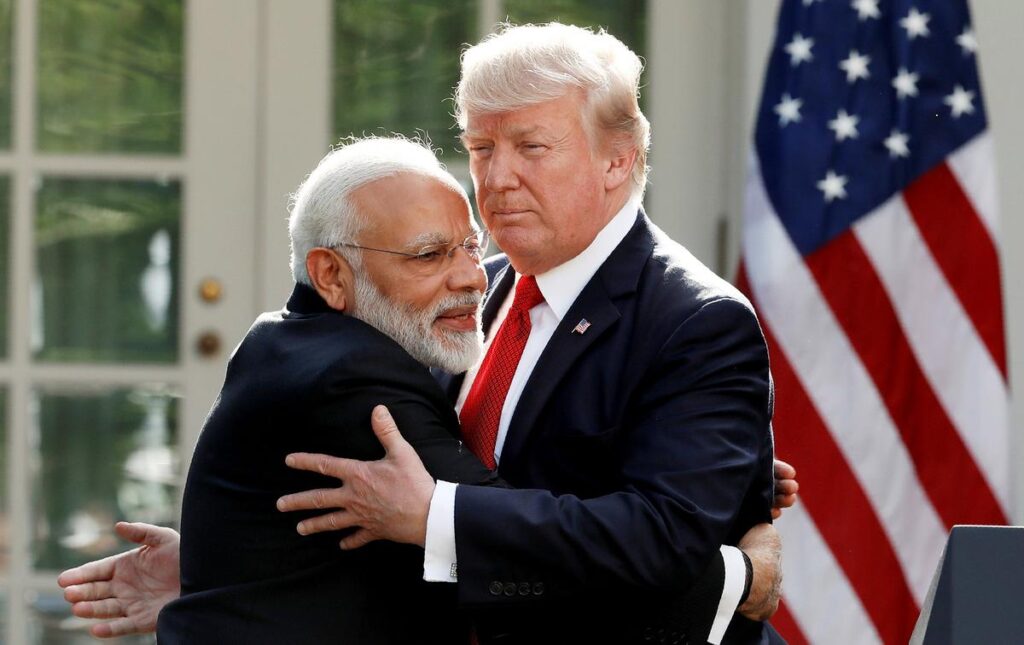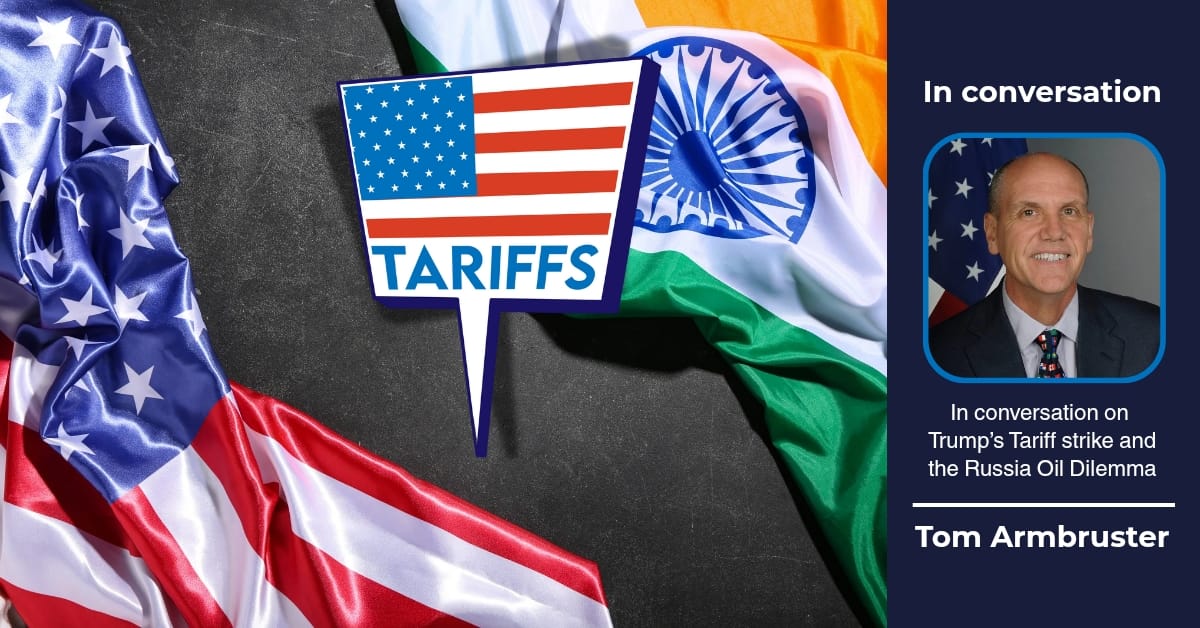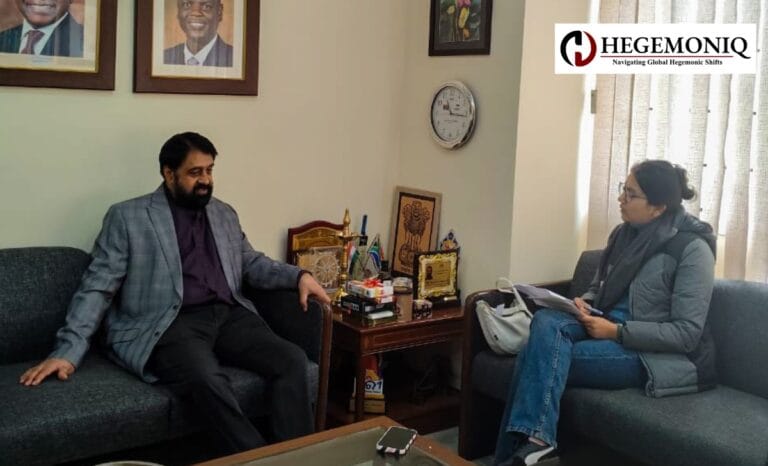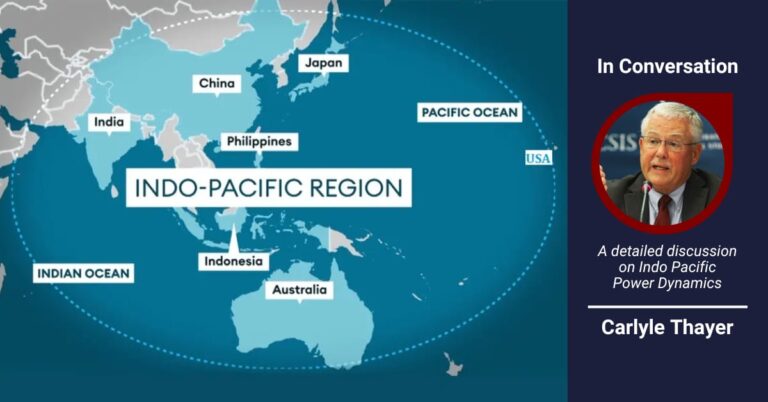“I would like to see more pressure on Russia from all countries, especially big, important countries like India. Russia’s invasion of Ukraine is a violation of the United Nations charter.“: Tom
Context of the Interview
We spoke to Ambassador Tom Armbruster on USA Tariff because sometimes, to understand what’s really going on in global politics, you need to hear from someone who’s actually been on the inside.
Tom served as the US Ambassador to the Marshall Islands and has spent years working in places like Russia and Cuba. He’s seen diplomacy up close, not just from behind a desk, but on the ground, where decisions actually play out.
With all the noise around India–US relations, USA tariffs, and global power shifts, we wanted to cut through the surface talk. What does someone like Tom really think about the direction things are heading? How does the US see India right now? And what’s actually at stake (after USA Tariff)?
This interview is part of our effort at HEGEMONIQ to bring real conversations into the open—honest, clear, and based on experience, not just opinions.
An Interview by Nayan Jyoti Kalita, Founder, HEGEMONIQ.

IN CONVERSATION with Tom Armbruster on USA Tariff
HEGEMONIQ: Do you see Trump’s decision to impose steep tariffs on India as a turning point in US-India strategic relations or just another transactional episode(after USA Tariff)?
Tom Armbruster: “The key word is “transactional.” That is the lens through which every relationship with the United States now has to be viewed. So this is an episode(USA TAariff), not a turning point, and one that India can manage successfully if it stays pragmatic. The real turning point in relations came after India liberalized and globalized its economy in 1991, propelling the U.S. to be India’s leading trade partner. The volume in trade in both directions gives the relationship ballast. The other factor that will keep the relationship on track is the large Indian diaspora in the United States. With over 5 million people, mostly well-educated people who vote, the Indian community can make its voice heard in American politics, much like the Israeli lobby has done over the years. Indians may underestimate their power in American politics, they shouldn’t. It is substantial.
Relationships that are transactional are by their nature temporary. There is no American long term vision or grand strategy. In fact, if somehow Russia and Ukraine reach an agreement, which seems more probable this week than last, the question of India’s purchases of Russian energy will just be a blip in the history of the relationship. For that reason, it is in India’s interest to ignore the rhetoric and negotiate hard to get what is in India’s interests. What President Trump, the “Art of the Deal” author wants, is to make deals. So India needs to think in those terms.
This is a shift for most diplomats. Diplomats usually walk into a meeting with talking points that are meant to be persuasive. Normal diplomacy is a give and take with multiple interests taken into account and relations advancing with every new cultural tie, business deal, or high level visit. Trump has taken diplomacy in a new direction. The language is simply money. Now, diplomatic discourse is more a transaction at a trading post. The talking points that matter will be the ones that you can attach a price to. If the U.S. wants India to stop buying Russian oil, what is the U.S. willing to provide India? It’s a two way street.”
Help our independence voice
Support us by donating even a small amount .
HEGEMONIQ: President Trump has accused India of indirectly fueling the Russia-Ukraine war by buying discounted Russian oil. How do you view this allegation, and what kind of pressure could it create on India diplomatically?
Tom Armbruster: “I would like to see more pressure on Russia from all countries, especially big, important countries like India. Russia’s invasion of Ukraine is a violation of the United Nations charter. Countries should pay a price for invading peaceful neighbors. China, North Korea, and Iran are the main Russian enablers, proving money, soldiers, and weapons, but Russia relies on its oil revenues to keep the economy afloat. If all countries boycotted Russian oil there could be an effect.
But, let me frame this discussion in terms of languages. Terrorism is the lowest form of diplomacy. It is a brutal means of communication, but the message is usually clear. The Trump Administration’s diplomatic language is money. It’s transactional. Russia’s diplomatic language is force. That is the language understood in the Kremlin, so ultimately I don’t see an end to Russia’s aggression in Ukraine until Russia is defeated on the battlefield.”
HEGEMONIQ: Indian counterparts have repeatedly accused the US and the West of hypocrisy-criticizing India for importing Russian oil while Western imports of Russian gas have quietly increased. Your comment on that?
Tom Armbruster: “President Trump has been inconsistent in his position on Russia. Limiting the sale of arms and intelligence-sharing, and then reversing course and moving ahead. The U.S. does not have the moral high ground on this question. But the issue is whether it is in India’s best interest to push back on this point, or, more advantageously, to use this moment to negotiate on a full range of issues, from trade to defense cooperation, even to increasing the number of Indian students in American universities. India should put everything on the table.”
HEGEMONIQ: How do you think these USA tariffs will impact India’s long-term role as a US partner in balancing China in the Indo-Pacific?
Tom Armbruster: “This is ultimately the more important question. China has flexed its muscles in the region, but has not yet taken the region to a crisis point with its intentions towards Taiwan. Russia made all of Europe choose with its invasion of Ukraine. It would be foolish to think China is not watching and calculating the price it would pay in the international community for a similar adventure against Taiwan.
If the world imposes strong sanctions and consequences on Russia, it will help guide China’s thinking. In that respect, it is in India’s interest to play a diplomatic role urging Russia to withdraw and an economic role by not rewarding Russia for its aggression. I know there is a domestic aspect and Indian farmers and consumers need cheap oil for their own economic well being, but that has to be part of the math that India does when calculating just how far India can go.”
HEGEMONIQ: Could this sharp downturn(After USA Tariff) in relations push India to deepen ties with Russia or even China and other non-Western powers- intentionally or by necessity?
Tom Armbruster: “No, and I would argue with the term “sharp downturn.” Some kind of deal engineered by savvy Indian negotiators can actually lead to a stronger relationship overall. Talk to the U.S. and remember the tariff numbers are always negotiable. Apparently everything is these days.”

HEGEMONIQ: How might this(USA Tariff) affect India’s place in Western-led strategic groupings like QUAD? Could we see a more neutral or even reluctant India in future cooperation after the USA Tariffs?
Tom Armbruster: “The QUAD is a creation of the rise of China. India is a great world power and has global interests. It can manage its relationship with the U.S. on the Ukraine issue while maintaining its role as a key player in the QUAD. The Quadrilateral Security Dialogue, has tremendous potential with India, the US, Japan, and Australia, all being Pacific powerhouses. The QUAD’s very noble raison d’etre is a free, open, and inclusive Indo-Pacific region. That goal is certainly worth a substantial investment, not just in terms of defense, but also development in the Pacific, disaster response, maritime resource management, and global health. India can play a constructive role.
If Russia had chosen a democratic path after the fall of the Soviet Union, like the Baltics for example, Russia could now be a leader in the Pacific region as well, given Russia’s resources in the Far East and its leading cities like Vladivostok, Sakhalin, and Khabarovsk. (By the way, the Indian consulate in Vladivostok was very active in the Russian Far East.) Russia is missing an opportunity by pursuing this war in Ukraine and forfeiting the chance to be a full economic and diplomatic partner in the Pacific, the most economically powerful region in the world with 60% of global GDP and 50% of global trade.”
(Also Read: Economic Sanctions In US Foreign Policy: Effectiveness, Ethics, And Consequences)
HEGEMONIQ: With these moves, is the US sending a message that values-based partnerships matter less than policy alignment on specific issues like Ukraine or trade?
Tom Armbruster: “The Cold War was a battle of values. Democracy against autocracy. Freedom of the press versus government propaganda. And so on. That thinking made all other issues secondary. We seem to be in a period where decisions are made for the current news cycle and short term gains. The bedrock values that guided diplomatic relations have eroded, and not to our benefit.”
HEGEMONIQ: Looking ahead, what’s the risk that this strain becomes permanent, changing the trajectory of US-India relations for the next decade?
Tom Armbruster: “Minimal. The U.S. domestic landscape is still deeply divided. We may see swings from the Trump transactional style of diplomacy back to more traditional values based and ally based diplomacy if the Republicans are voted out of the White House, or even lose their majority in Congress. But the U.S.-Indian relationship is not marred by a lot of baggage the way the U.S.-Russian relationship is.
There is a lot of resentment in Russia that the United States “won” the Cold War and that the liberal, democratic model by and large is very successful in the world. India and the U.S. reminds me of the Russian-American relationship must have been like in the 1800’s, before Russia’s turmoil and long suffering with a communist model. India and the U.S. are great innovative powers with well educated populations that can only benefit from more engagement. There is no limit to the relationship if we keep it pragmatic and focused on the long term. My main word of advice for India is to engage, No matter what type of administration is in power in Washington. India is simply too important not to have its interests taken seriously.”
About Tom Armbruster
Tom Armbruster served as U.S. Ambassador to the Marshall Islands, and Senior Advisor to the U.S. Mission to the United Nations, and to U.S. Embassy Nuku’alofa, Tonga. He was the US Embassy’s Nuclear Affairs Officer in Moscow from 1998-2000. He is currently an independent foreign affairs consultant.
(Connect to Amb. Tom Armbruster through LinkedIn)
(Disclaimer: Views and opinions expressed in this interview(USA Tariff strike and the Russia Oil Dilemma: Ambassador Tom Armbruster on the Indo-US tie and its future) are solely those of Amb. Tom Armbruster’s and do not reflect the official stance of HEGEMONIQ. We provide this platform to encourage diverse perspectives and informed discourse. While we respect the insights of our esteemed interviewees, HEGEMONIQ neither endorses nor takes responsibility for any claims, accusations, or terminology used in this interview.)
USA Tariff USA Tariff USA Tariff USA Tariff USA Tariff USA Tariff USA Tariff USA Tariff USA Tariff





[…] USA Tariff strike and the Russia Oil Dilemma: Ambassador Tom Armbruster on the India-US tie and its… […]